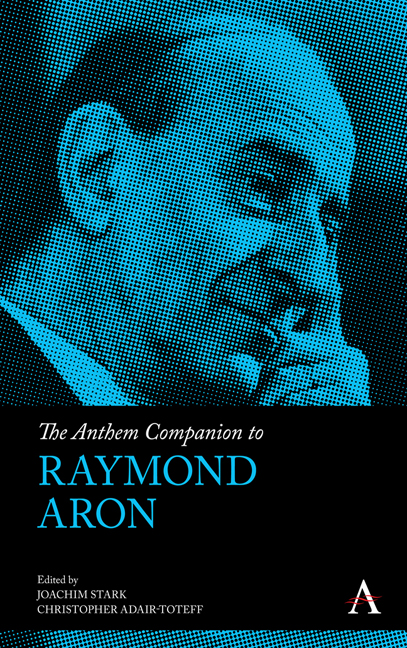Book contents
- Frontmatter
- Contents
- Acknowledgements
- Introduction: Retracing Aron’s Routes to Sociology
- Chapter One The Subject, Pluralism and Équité: Raymond Aron and Sociology
- Chapter Two Aron, Weber and Nationalism
- Chapter Three Equivocal and Inexhaustible: Aron, Marx and Marxism
- Chapter Four The Opium of the Intellectuals
- Chapter Five A New Era in the Human Adventure: Industrial Society and Economic Growth
- Chapter Six Raymond Aron: La lutte de classes
- Chapter Seven Political Philosophy Meets Political Sociology: Raymond Aron on Democracy and Totalitarianism
- Chapter Eight The Contradictions of Prometheus: Wisdom and Action after the Disillusionment of Progress
- Chapter Nine The International Problem and the Question of the Best Political Regime
- Chapter Ten War and Irrationality: Aron and Pareto
- Conclusion: Aron on Liberty
- Notes on Contributors
- Index
Chapter Eight - The Contradictions of Prometheus: Wisdom and Action after the Disillusionment of Progress
Published online by Cambridge University Press: 22 February 2022
- Frontmatter
- Contents
- Acknowledgements
- Introduction: Retracing Aron’s Routes to Sociology
- Chapter One The Subject, Pluralism and Équité: Raymond Aron and Sociology
- Chapter Two Aron, Weber and Nationalism
- Chapter Three Equivocal and Inexhaustible: Aron, Marx and Marxism
- Chapter Four The Opium of the Intellectuals
- Chapter Five A New Era in the Human Adventure: Industrial Society and Economic Growth
- Chapter Six Raymond Aron: La lutte de classes
- Chapter Seven Political Philosophy Meets Political Sociology: Raymond Aron on Democracy and Totalitarianism
- Chapter Eight The Contradictions of Prometheus: Wisdom and Action after the Disillusionment of Progress
- Chapter Nine The International Problem and the Question of the Best Political Regime
- Chapter Ten War and Irrationality: Aron and Pareto
- Conclusion: Aron on Liberty
- Notes on Contributors
- Index
Summary
For Raymond Aron the idea of progress was not a principle of action or a source of wisdom. As a philosopher of the limits of historical knowledge, Aron reflected on the persistence in the modern age of the perennial drama of history—“the rise and fall of empires, rivalry between regimes, and the beneficial or baleful exploits of great men.” Progressivism brings no end to the human drama, since it provides no univocal criterion of the human good.
Aron did not replace the ordinary distinctions of moral judgment or the virtues of government with the imprudent alternative between progress and reaction. He did not “believe” in progress; the progressive thesis is not believable for a French citizen of Jewish origin or for a good European who has lived through and taken seriously the boundless troubles that defined the twentieth century. He elaborated a sociology in which politics must remain a decisive experience, because the argument or dogma of progress cannot dictate the choices of nations or the analysis of societies. Aron did not distance himself by methodological abstraction from the responsibilities and obligations of human beings.
The title of one of Aron's last essays, “For Progress: After the Fall of Idols,” may give another impression, but the work itself confirms Aron's objections to progressivism. Aron sounds like a progressive in this work only if we forget that, in his last years, the idols of the century seemed to be taking reason down with them in their “postmodern” collapse, just as they had perverted reason in its totalitarian elevation. The unifying orientation of Aron's philosophy and sociology should at the outset exclude all misunderstanding on this question: the desacralization of the idolatry of history and the theoretical refutation of a comprehensive determinism were constitutive of his perspective. A reasoned refusal to reduce human accomplishment to history prepared the way for Aron's “praxeology” and motivated his effort to discern the “historical consciousness” of modern societies. This project produced, in the shadow of the war, a political and spiritual diagnosis of the European situation that included a finding that still impresses today, an analysis as simple as it is precise: “The political and historical optimism of the nineteenth century has died in every country. Today there is no question of saving bourgeois, humanitarian or pacifist illusions.
- Type
- Chapter
- Information
- The Anthem Companion to Raymond Aron , pp. 133 - 152Publisher: Anthem PressPrint publication year: 2021

